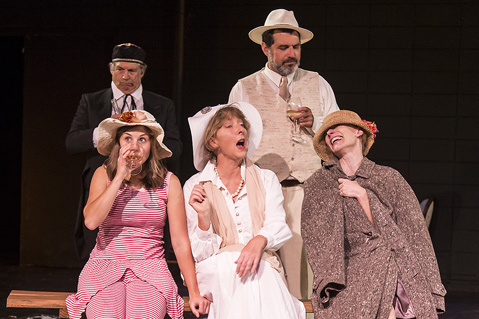Review: The Cherry Orchard at Porter Theatre
Lit Moon Theatre Company Showed its Chops on September 4

The Lit Moon Theatre Company’s distinctive aesthetic — quirky, visually inventive, more expressionistic than naturalistic — isn’t an obvious fit for the plays of Anton Chekhov. But the troupe’s first production of the great Russian dramatist’s work — The Cherry Orchard, which it performed last weekend at Westmont College — is nothing less than a triumph.
Director John Blondell and a strong cast managed to find a surprising number of laughs in this melancholy tale of missed connections and missed opportunities (which the playwright did, after all, call a comedy). More importantly, they have created a staging that not only never feels stagnant (always a distinct possibility with Chekhov, since his plays contain so little plot) but also builds to a deeply moving conclusion.
The set is minimal: a few chairs, a table, a piano, and a scattering of what appear to be fall leaves on the floor, presumably representing the final days of the sociopolitical system represented by the family at the play’s center. Liubov Ranyevskaya (a luminous Victoria Finlayson, whose combination of self-dramatization and self-deception brings to mind Blanche duBois) has just returned to her family estate in rural Russia after five years abroad.
She discovers much has changed: As old family friend and successful businessman Lopakhin (Mitchell Thomas) informs her, she’ll have to make major changes or face bankruptcy. But like a more stubborn version of Lord Grantham of Downton Abbey, the aristocrat finds herself unable to act, and her passivity sets into motion a dramatic reversal of fortunes.
Then again, pretty much all of the characters get in the way of their own happiness; for Chekhov, that is the human condition. In traditional productions, they tend to keep their feelings of frustration and despair fairly close to their vests; here, they’re much more overt. It’s a risky choice — you don’t want the characters to come across as ridiculous — but it pays real dividends, making their pain (and occasional high spirits) quite palpable.
Blondell made two outside-the-box casting choices, only one of which works. Brian Harwell is far too old to play the idealistic perpetual graduate student Trofimov; his lengthy conversation with Madame Ranyevskaya, in which she speaks of “your generation,” makes no sense, given how close they are in age. On the other hand, having the minor character of Carlotta played by a bearded man in drag is a hilarious touch, partly because the role is so odd to begin with and partly because of the way Jeff Mills throws himself into the part. (His magic tricks aren’t bad, either.)
In addition, Nina Sallinen as Liubov’s deeply unhappy stepdaughter, and Stan Hoffmann as the elderly servant Firs, are especially effective. Jim Connolly wrote and performs a wonderfully evocative original score.



